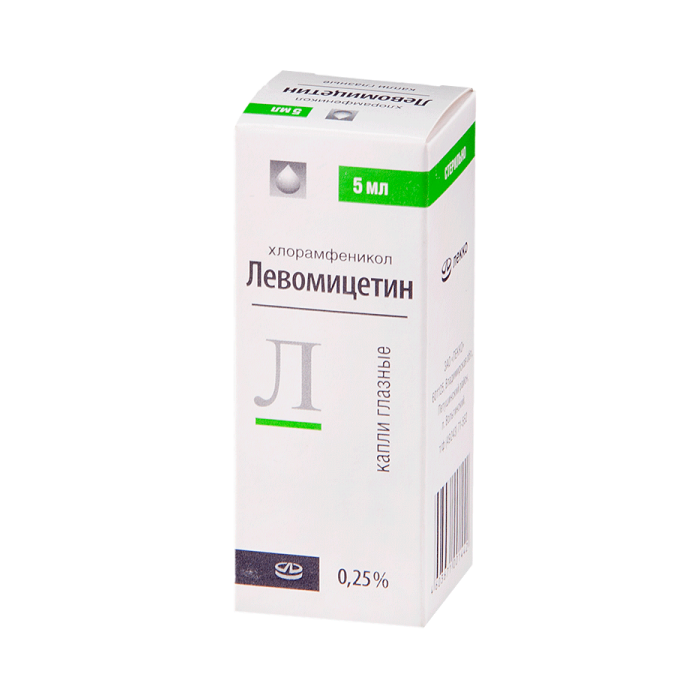chloramphenicol | Levomycetin, left 5 ml
Special Price
$26
Regular Price
$33
In stock
SKU
BID462038
Latin name
LEVOMYCETIN
LEVOMYCETIN
Latin name
LEVOMYCETIN
Release form
Levomycetin. Eye drops
Packaging
In a polymeric dropper bottle 5 ml of a solution of eye drops.
Pharmacological action
Broad-spectrum antibiotic. The antimicrobial mechanism is associated with a violation of the synthesis of proteins of microorganisms. It has a bacteriostatic effect. Active against gram-positive bacteria: Staphylococcus spp., Streptococcus spp. gram-negative bacteria: Neisseria gonorrhoeae, Neisseria meningitidis, Escherichia coli, Haemophilus influenzae, Salmonella spp., Shigella spp., Klebsiella spp., Serratia spp., Yersinia spp., Proteus spp., Rickettsia spp. active against Spirochaetaceae, some large viruses.
Chloramphenicol is active against strains resistant to penicillin, streptomycin, sulfonamides.
The resistance of microorganisms to chloramphenicol develops relatively slowly.
Indications
Bacterial infections of the eye caused by susceptible microflora:
Conjunctivitis.
Keratitis.
blepharitis.
Contraindications
hemopoiesis inhibition
skin diseases (psoriasis, eczema, fungal diseases)
pregnancy
newborn children
individual intolerance to the drug.
Use during pregnancy and lactation
Contraindicated in pregnancy.
Composition
1 ml eye drops 0.25% contain: chloramphenicol - 2.5 mg:
Excipients: boric acid - 20 mg, purified water - up to 1 ml.
Dosage and administration
The drug is instilled in a conjunctival sac, 1 drop 3-4 times / day.
If the patient takes the drug at his discretion, it is not recommended to use more than three days without consulting a doctor.
Side effects
Allergic reactions may develop.
Drug Interaction
Co-administration with sulphonylamide preparations is not recommended to prevent exacerbation of hematopoiesis.
overdose
Symptoms: gray syndrome in preterm and newborn infants at high doses (the cause of development is accumulation of chloramphenicol due to immaturity of liver enzymes, and its direct toxic effect on the myocardium) - bluish-gray skin color, low body temperature, irregular breathing, no reactions, cardiovascular failure. Mortality - up to 40%. Treatment: hemosorption, symptomatic therapy.
Storage conditions
Store in a dark place at a temperature not exceeding 25 РC.
Expiration
2 years.
Active substance
Chloramphenicol
dosage form
Dosage form
eye drops
LEVOMYCETIN
Release form
Levomycetin. Eye drops
Packaging
In a polymeric dropper bottle 5 ml of a solution of eye drops.
Pharmacological action
Broad-spectrum antibiotic. The antimicrobial mechanism is associated with a violation of the synthesis of proteins of microorganisms. It has a bacteriostatic effect. Active against gram-positive bacteria: Staphylococcus spp., Streptococcus spp. gram-negative bacteria: Neisseria gonorrhoeae, Neisseria meningitidis, Escherichia coli, Haemophilus influenzae, Salmonella spp., Shigella spp., Klebsiella spp., Serratia spp., Yersinia spp., Proteus spp., Rickettsia spp. active against Spirochaetaceae, some large viruses.
Chloramphenicol is active against strains resistant to penicillin, streptomycin, sulfonamides.
The resistance of microorganisms to chloramphenicol develops relatively slowly.
Indications
Bacterial infections of the eye caused by susceptible microflora:
Conjunctivitis.
Keratitis.
blepharitis.
Contraindications
hemopoiesis inhibition
skin diseases (psoriasis, eczema, fungal diseases)
pregnancy
newborn children
individual intolerance to the drug.
Use during pregnancy and lactation
Contraindicated in pregnancy.
Composition
1 ml eye drops 0.25% contain: chloramphenicol - 2.5 mg:
Excipients: boric acid - 20 mg, purified water - up to 1 ml.
Dosage and administration
The drug is instilled in a conjunctival sac, 1 drop 3-4 times / day.
If the patient takes the drug at his discretion, it is not recommended to use more than three days without consulting a doctor.
Side effects
Allergic reactions may develop.
Drug Interaction
Co-administration with sulphonylamide preparations is not recommended to prevent exacerbation of hematopoiesis.
overdose
Symptoms: gray syndrome in preterm and newborn infants at high doses (the cause of development is accumulation of chloramphenicol due to immaturity of liver enzymes, and its direct toxic effect on the myocardium) - bluish-gray skin color, low body temperature, irregular breathing, no reactions, cardiovascular failure. Mortality - up to 40%. Treatment: hemosorption, symptomatic therapy.
Storage conditions
Store in a dark place at a temperature not exceeding 25 РC.
Expiration
2 years.
Active substance
Chloramphenicol
dosage form
Dosage form
eye drops
Submit your review to Earn 10 Reward Points click here to login
Write Your Own Review

